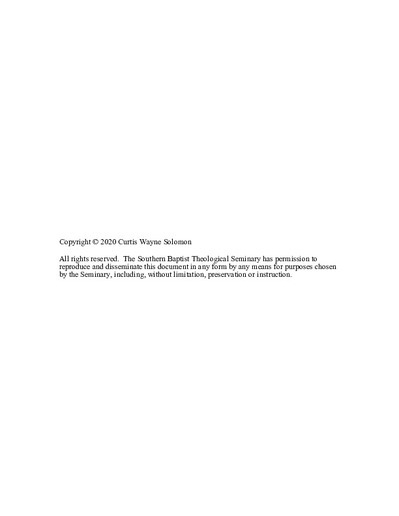| dc.contributor.advisor | Pierre, Jeremy P. | |
| dc.contributor.author | Solomon, Curtis | |
| dc.date.accessioned | 2020-05-29T20:42:31Z | |
| dc.date.available | 2020-05-29T20:42:31Z | |
| dc.date.issued | 2020-05 | |
| dc.identifier.uri | https://hdl.handle.net/10392/6098 | |
| dc.description | Ph.D., The Southern Baptist Theological Seminary, 2020 | en_US |
| dc.description.abstract | Post-Traumatic Stress Disorder is a serious diagnosis that plagues many men and women who have served in the United States military. With high veteran suicide rates, an overwhelmed VA system, and a host of treatments that are often ineffective; it is important to find affordable and effective alternative treatment options. Additionally, there is a growing recognition that spirituality plays a key role struggle of PTSD and therefore must play a role in its treatment. The Mighty Oaks Foundation has developed multiple programs that are designed to help men and women struggling with PTSD as well as their spouses and families. The flagship program of Mighty Oaks is the Legacy Program, a week-long residential, peer-to-peer, faith-based treatment program. This dissertation employs a variety of research methods in order to assess the effectiveness of the Legacy Program for men.
Chapter 1 describes the purpose for the current study, lists research questions that will be addressed by the research. This chapter also offers delimitations to the research and provides a procedural overview of the research that was conducted.
Chapter 2 reviews the precedent literature relating to Post Traumatic Stress Disorder. This provides an overview of the history of PTSD, various treatments available for PTSD and studies to determine their effectiveness. This chapter also offers insights from biblical counseling literature on the topic of PTSD.
Chapter 3 gives an overview of the Mighty Oaks Foundation. It recounts the history of the ministry, describes its philosophy, and reviews the content of the Legacy Program for Men.
Chapter 4 outlines the methodology of the research undertaken in this dissertation. It includes a restatement of research questions and how each will be addressed in the research. Information on the population studied, instrumentation, and research procedures used are also covered in this chapter.
Chapter 5 provides an analysis of the findings. The quantitative pre/post-test study demonstrated that attendance at the Legacy Program reduces one’s PTSD symptoms and results in an increase in one’s faith. The correlation between these two changes was not demonstrated to a clinically significant degree by the data. The retrospective alumni survey also provided insights into what components were seen as beneficial by participants.
Chapter 6 offers conclusions drawn from the data gathered in the research. Recommendations for implementing this type of program are made and areas for further research are also proposed. | en_US |
| dc.subject.lcsh | Mighty Oaks Foundation. Legacy Program | en-us |
| dc.subject.lcsh | Post-traumatic stress disorder--Religious aspects--Christianity | en-us |
| dc.subject.lcsh | Post-traumatic stress disorder--Treatment | en-us |
| dc.title | Evaluating the Legacy Program of the Mighty Oaks Foundation: A Mixed-Method Study | en_US |
| dc.type | Electronic dissertation | en_US |
| dc.type | Text | |
| dc.contributor.committee | Harrod, Joseph C. | |
| dc.contributor.committee | Jones, Robert D. | |
| dc.type.qualificationname | Ph.D. | en_US |
| dc.publisher.institution | Southern Baptist Theological Seminary | en_US |
| dc.publisher.department | School of Missions and Evangelism | |

